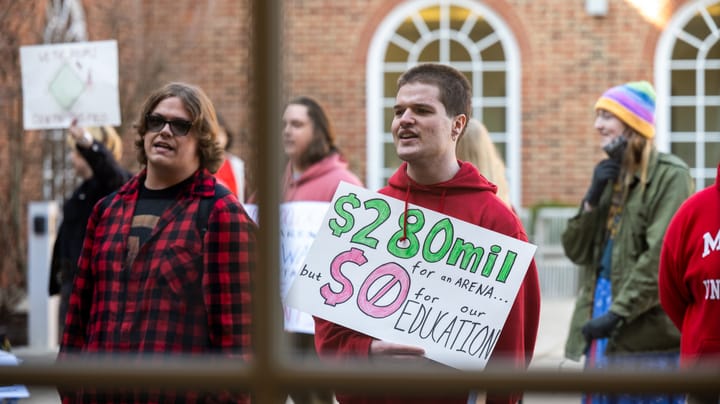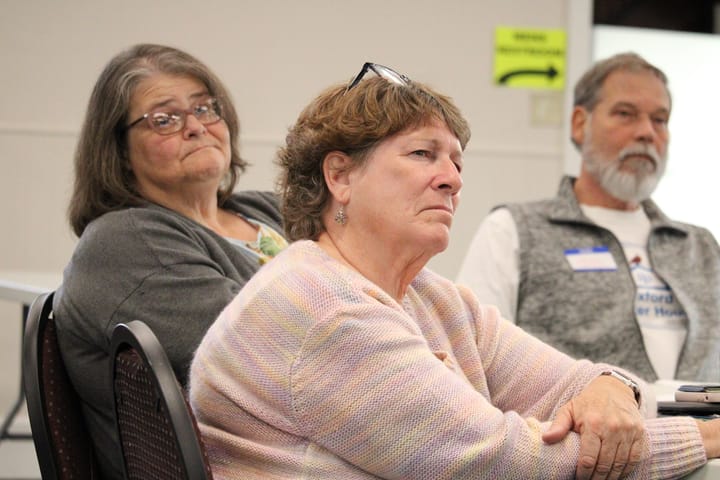“Good Trouble Lives On” Marches through Oxford
More than 60 protesters gathered as part of the National Day of Action, voicing opposition to the Trump administration.

The “Good Trouble Lives On” protest made its way through Oxford on July 17, hosting a variety of speakers who shared stories of hope and protest against the Trump administration.
“Good Trouble Lives On” is a national day of action that aims to “respond to the attacks on our civil and human rights by the Trump administration,” according to the movement’s website. It also intends to remind Americans that the power of change is in their hands.
This is the fifth year of the event, which takes place annually on July 17 to commemorate the passing of John Lewis, a civil rights activist and former United States representative.
Lewis conceived the term “Good Trouble,” which means “the action of coming together to take peaceful, non-violent action to challenge injustice and create meaningful change.”

The protest was organized by the 50501 Movement, an organization that contributed to the June 14 No Kings protests across the United States alongside other activist groups, including Indivisible, the American Civil Liberties Union (ACLU) and Public Citizen.
Attendants first marched through Oxford while carrying a variety of protest signs and chanting. Around 60 people joined in to showcase their beliefs, frustrations and community.

Jay Stevison, a participant in the event, joined the protest because he believes his family deserves the same opportunities he had.
“I’ve got grandkids, and I enjoyed a lot of freedom, and I think they should too,” Stevison said.
Nila Leslie, the chant leader for the event and a frequent activist, expressed the need for more people to stand up for their beliefs. “I know so many people who don’t agree with what is going on and they just remain silent — it’s really frustrating,” Leslie said.

Leslie described what she believes is needed to bring people together and progress these protests in order to make real change.
“What we really need to do is get the smaller communities involved,” Leslie said. “No one really covers the small [communities], and the more people they can see in mass amounts is what is really going to make an impact.”
Leslie explained that a large part of building community is found within the individual: courage.
“You have to have courage,” she said. “You taking an active role in your rights is what is going to get [us] out of this mess.”
After protesters gathered and chanted around Oxford Memorial Park, the event moved inside the Interfaith Center. This segment of the event saw a cast of local speakers telling stories, sharing messages of hope and expressing a call to action.

Speaker LaTricia Hillman, owner and teacher at The Loft Preschool in Oxford, expressed what her career as an educator and preschool teacher has taught her about activism.
“Day after day, I urge empathy, curiosity, community and courage in the little hearts of children who will one day inherit this world.” She continued: “Every single adult here was once a child who spoke up when something felt wrong no matter what.”
Hillman urged participants to choose courage in their day-to-day lives and to fight for hope grounded in action.

Reverend Vanessa Cummings, NAACP vice president and activist, spoke about the importance of coming together to enact change.
“Now is the time to educate ourselves, our families, our friends and our communities about what is going on,” Cummings said. “We must fight the good fight.”
Cummings also expressed frustration regarding the recent bill passage by the United States House of Representatives that aims to take away $9 billion in previously allocated federal funds to foreign aid and public broadcasting.
“The right of the people has been voted down in the state of Ohio,” Cummings said. “Now is the time – the fierce urgency of now – to stop whining and complaining. It’s time to unite, stand together … It’s the time to make good trouble.”
City Councilor Franklin said the event reminded her of the importance of making your voice heard through non-violent protest.
“People think of non-violence as the absence of something,” Franklin said, “but it’s actually the presence of strength. Non-violence is an active position where you are standing up to threats in a way that is actually stronger morally than violence. Violence is not the answer, but taking a non-violent position is more powerful morally, and it’s more sustainable for society than violence.”
Although frustration toward a variety of issues echoed throughout the evening’s remarks, some participants had a more positive outlook.
“It fills me with hope,” Franklin said. “I get discouraged too even as a city council member, like when I focus too much on the negative things that are happening [in the] media … These kinds of events renew my hope and actually give me a little bit more energy.”
Father Kip Colegrove, a retired Episcopal priest from Oxford, shared her same sentiment. As he sat quietly at the back of the Interfaith Center, listening intently to the passionate speakers. Reflecting on the day’s events, he offered a hopeful takeaway:
“Those of us who really love our country are rediscovering what patriotism really is.”




